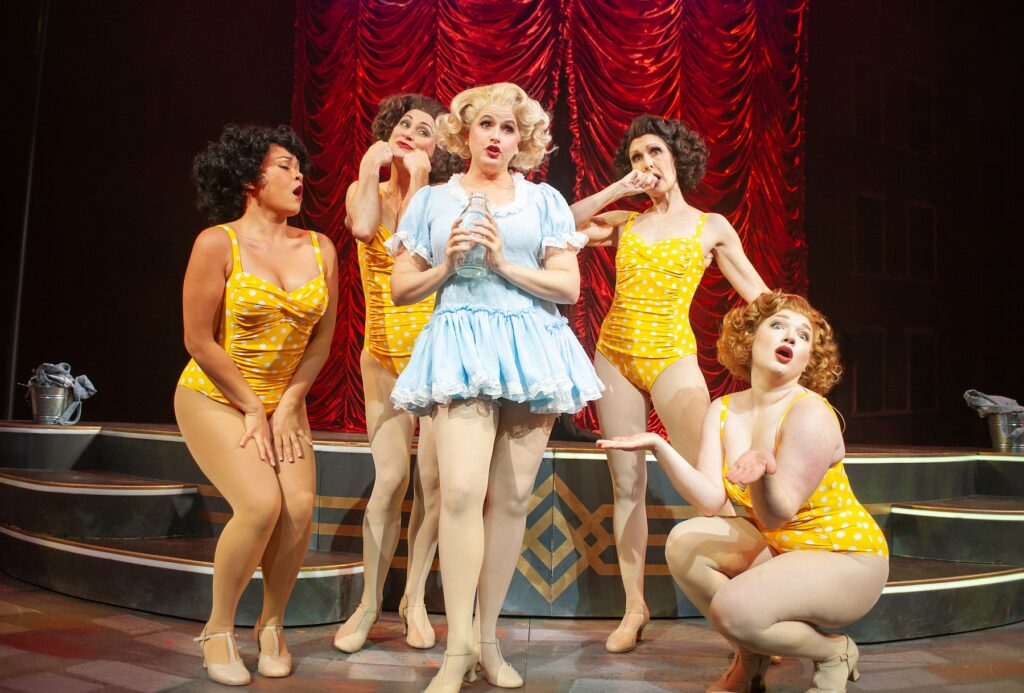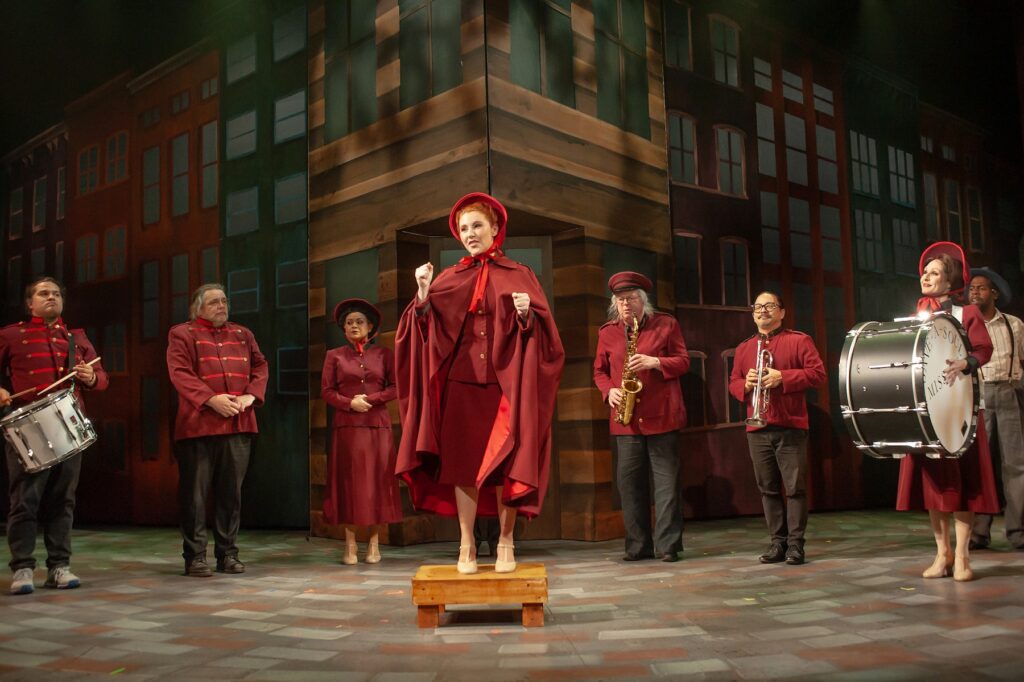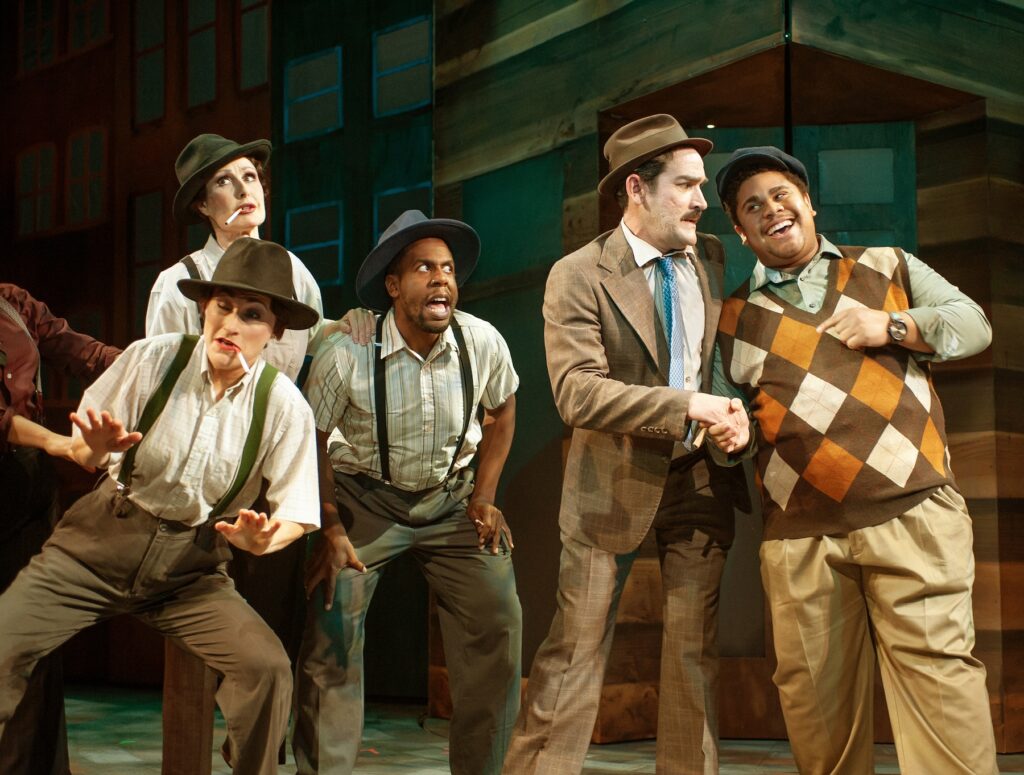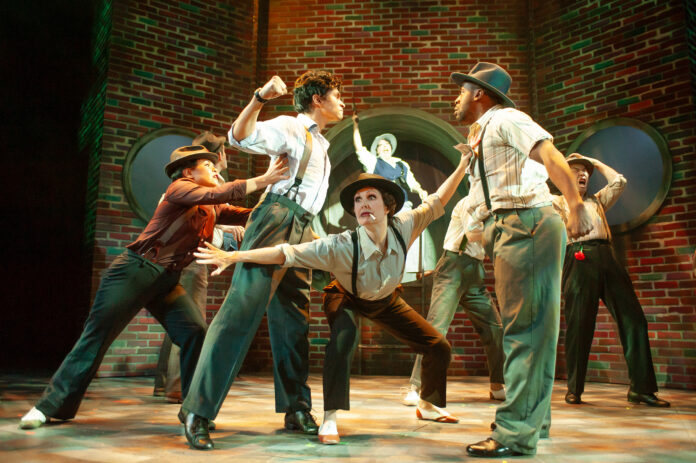There are some works that are so conventional that they might as well be handed out like free samples at the food court. It doesn’t mean that they’re bad, per se, but that they’re so locked in the public consciousness as inoffensive, middle-of-the-road fare that to focus on the poorly aged elements that actually are offensive is to attack something sacred or be “thinking too much” about something mundane. Still, the works can be entertaining.
Guys and Dolls (through January 13 at the SF Playhouse) is that kind of old school standard. It’s up there with My Fair Lady, Funny Girl, The Music Man, and Bye Bye Birdie—a show that most youngsters, and quite a few adults, are likely to know more by name than through actual experience. Perhaps some of them recall seeing it put on as a high school production, but they’re at odds in trying to remember anything specific about it, other than maybe “that one song that’s always used in commercials.” For Guys and Dolls, the song is “Luck be a Lady”, and when everyone else who sings it is compared to a certain legendary blue-eyed crooner, expectations are pretty high.
The new Playhouse production directed by AD/co-founder Bill English does its best when it doesn’t concern itself with comparisons to previous iterations. The December musical is a Playhouse tradition, and it’s not hard to see why: no matter what a patron’s experience with theatre (or the Playhouse itself) over the past 12 months, the company wants them to end the year with a piece of comfort food.

For those not familiar: Guys and Dolls takes place in a post-WWII New York where gamblers are one bet away from becoming kings, every gal just wants to get hitched and become a queen, and putting all your trust in The Lord is a really tough sell. This is where we find Nathan Detroit (Joel Roster), a greasy-palmed hustler who told his best girl that he’d given up anything and everything related to gambling. Yet, everyone knows he’s still the guy to go to for underground craps games. When word gets out that gambler Sky Masterson (David Toshiro Crane) is coming to town, Nathan can’t resist the chance of winning big off a whale like Sky.
The bet in question is that Sky won’t be able to woo Sarah Brown (Abigail Esfira Campbell), the bible-thumping beauty at the Save-a-Soul Mission. Faster than you can say “Taming of the Shrew,” sly-boy Sky begins to work his magic on the pious Sarah. Meanwhile, Nathan is in danger on two fronts: 1) he’s in danger of a classic knee-breaking, or worse, if he can’t provide a gambling spot for heavy-roller Big Jule (the always-wonderful Jessica Coker); and 2) if he’s discovered hosting another den of sin, he’s in danger of losing Adelaide (Melissa WolfKlain), the showgirl love of his life.
This is a comedy, by the way.
So, once you get past the discomfort of the musical’s outdated gender norms (despite the mixed-gender casting, it’s still a story about women who only want to get married) and creepy ideas of “romance” (like Sky simply having to “wear down” the shrewish Sarah, whom he kisses without her consent), what you’re left with is a collection of catchy songs that need a talented cast to pull them off.

In a way, this production is almost like a redux of the Playhouse’s take on A Chorus Line earlier this year. Both were directed by English, but whereas the earlier, grittier show suffered from cartoonish portrayals of old-school “Nu Yawkahs”, this one has the advantage of its characters already being cartoonish. Characters like Big Jule, Nicely-Nicely (Kay Loren, also known for the Berkeley Playhouse), and Lt. Brannigan (Alex Hsu) are intentionally meant to chew the scenery without restraint. In fact, Heather Kenyon’s set, complete with English’s beloved rotating floor, seems as intentionally artificial as cardboard cutouts in a fun house. In Chorus Line—which shared several cast members and crew—the cartoonishness was a distraction; here, it’s a compliment, making it easier to digest the book’s obsolete worldview.
Help us save local journalism!
Every tax-deductible donation helps us grow to cover the issues that mean the most to our community. Become a 48 Hills Hero and support the only daily progressive news source in the Bay Area.
That doesn’t mean the production is lacking in nuance. The aforementioned Coker and Loren do their usual splendid jobs of making their characters as appealing as the performers’ voices are intimidating. In fact, there’s no real weak link in the cast. But it’s the chemistry between Campbell and Crane that’s the heart of the show. In the midst of all the mugging and pratfalls of their co-stars, the couple give understated performances that let you understand why someone would want to see these two get together.

It doesn’t change the fact that Sky whisks Sarah away to Havana under dubious means and plies her with her first alcohol (oy vey), but the Taming of the Shrew archetype has been problematic since, well, The Taming of the Shrew. What I’m saying is that it’s a case of performers triumphing over obsolete material.
As usual, I caught this during a mask-mandated performance. I happened to be seated behind a pair of subscribers who seemed intent on letting everyone within earshot know of their pretentious disdain for masking. Still, they put them on once an usher subtly pointed out that the Playhouse only has masked shows once a month (Tiiu Rebane’s curtain speech would say once-a-week), so it wouldn’t kill these guys to cover up for a single performance. Thankfully, the Playhouse’s HVAC—which gave the auditorium an artic chill—seems to be working fine, with my Aranet4 reading CO² levels that hovered around 555ppm for the entire two-act show.
Guys and Dolls is an overlong and outdated tale where things only go wrong to the extent that they can easily be fixed by the end. It’s from an era when such fluff musicals were as prolific as superhero movies are today. The new SF Playhouse production doesn’t challenge any of the show’s conventions, but it infuses the show with enough talent and production value to show just why such a show was as beloved as it was in its day.
GUYS AND DOLLS runs through January 13, 2024 at SF Playhouse. Tickets and further info here.





